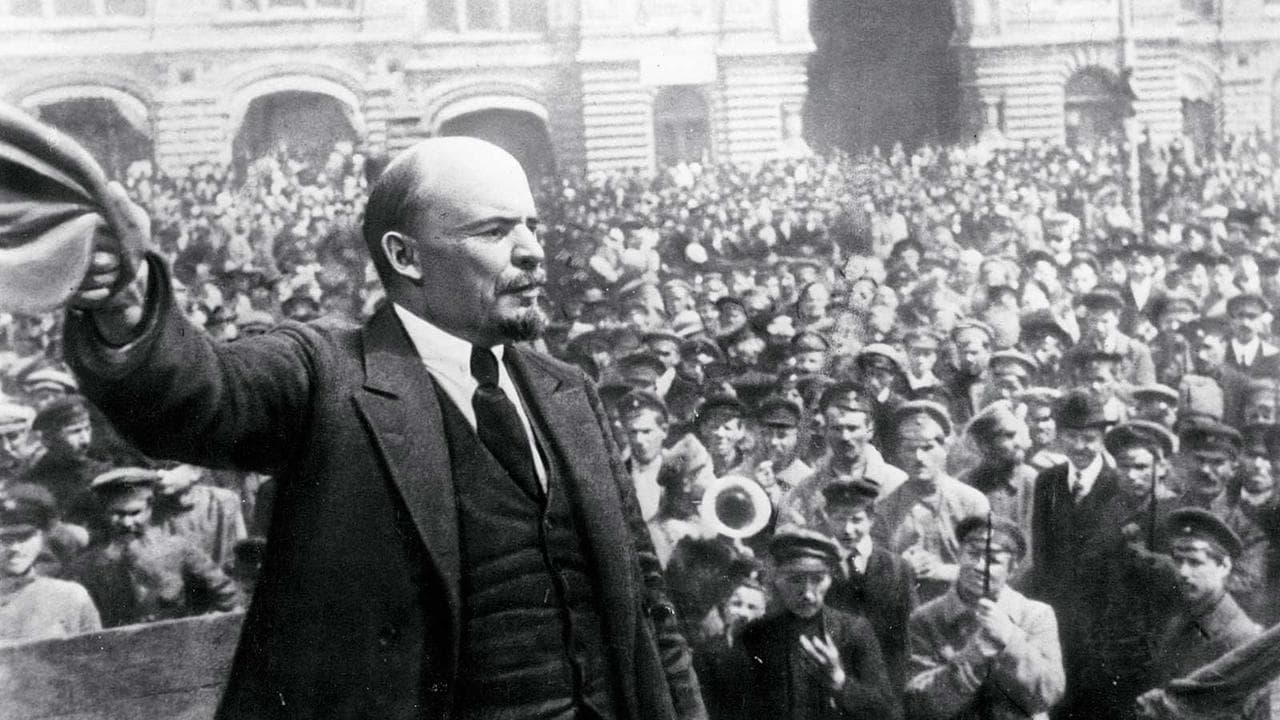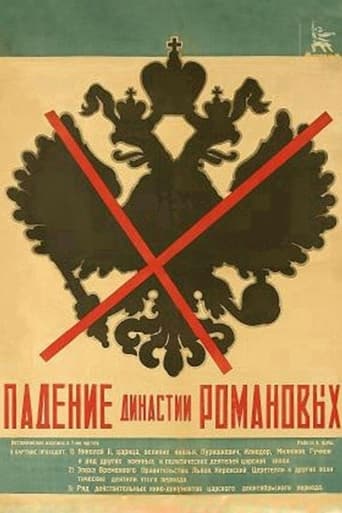Brightlyme
i know i wasted 90 mins of my life.
ThedevilChoose
When a movie has you begging for it to end not even half way through it's pure crap. We've all seen this movie and this characters millions of times, nothing new in it. Don't waste your time.
Neive Bellamy
Excellent and certainly provocative... If nothing else, the film is a real conversation starter.
Erica Derrick
By the time the dramatic fireworks start popping off, each one feels earned.
vladislavmanoylo
The strength of The Fall of the Romanov Dynasty is its collection of significant historical scenes, and that is probably enough to enjoy the movie despite its half-hearted attempts at delivering political and social statements. Despite what the title of the movie would have you believe, this is not about the Romanov Dynasty, or rather it is only incidentally about the Romanov Dynasty. What this movie is about is the tumultuous time of human history in and around the World War, the Great War, the first war of its kind. It's a subject with such weight that it is best expressed through images and motion, making it ideal for a silent film.An actual documentary of the Romanov Dynasty would need additional context to express its point, but hundreds of soldier marching across a crowd many times that size, or an enormous ship sinking, are both scenes that can be understood without narration. The bulk of the film is a collage of these sorts of scenes, and choosing to watch that is sufficient reason to watch the film, but unfortunately there's more. The film decided it needed a message and motive, and the one it chose is the evils of luxury and capitalism and they're disregard for the common man. For a person that subscribes to the ideology some of the imagery can incite righteous anger, for a person who doesn't some of the phrases used feel a lot like propaganda In either case the effect feels inconsequential when compared to the other subject of the film, similar to how the gravity of the moon is important not nearly as relevant as the gravity of the earth.TL;DR: The movie has great historical footage of war and some of the important characters involved, but also scenes of workers, capitalists, estates, government officials, etc. that appear unnecessary and maybe even unwanted.
Nate J
Fall of the Romanov Dynasty seems to not know what it wants to be as a film. Presenting a chronological set of not uninteresting documentary footage, Dynasty fails to present historical information in anything but the most barest of terms. On the other hand, the film completely lacks in dramatization or characterization, and so apparently styles itself as a historical narrative. The entire structure of the film is characterized by strange choices. The opening sequences, comparing the lives of the aristocracy and the lower classes in Tsarist Russia, are a fine exposition, but consume a whopping third of the total screen-time without much variation. Dynasty suggests that WWI was some sort of money-making venture among the ruling classes and industrialists of Europe, which leads one to believe one is watching a work of socialist propaganda. However, when the revolution is finally reached, it is depicted almost entirely as a reactionary movement to the horrors of the war and the inabilities of the monarchy rather than an ideological battle. The images of mobilization and war are the most exciting ones, and in that sense, fail to fulfill the apparent goal of denouncing imperial injustices. Perhaps the strangest element is the choice to relegate the Bolshevik revolution to the final three minutes of the film: we see Lenin denouncing the provisional government, and then a cut to credits. It may be the case that film-goers had tired of the revolutionary story by 1927, but this eliminates what is probably the most compelling part of Russia's role in WWI. The film's strengths lie in the candid footage; we see the big names – Nicholas II, Kerensky, Lenin – in living movement, and perhaps the only view that many Russians would have gotten of them. Images of imperial and religious ceremonies are well juxtaposed with shots of toiling peasants and marching protesters in a sort of a slide show of pre- and post-revolutionary norms. On the whole, though, Fall of the Romanov Dynasty is rather directionless, and fails to either present a compelling revolutionary ideology or a historical reflection of any depth.
dminkin
I knew it was coming shortly… the answer I couldn't bear to see. The Bolsheviks featured in history. To the victors go the glory, even in the face of war and death. Well that's the ending, which comes slinking in to corrupt what would have been a legitimate effort to provide a synopsis of the preceding 20 years accompanied by both reasonably relevant and appropriate visual material. But don't suppose there was any nuance, oh no, the presentation of events both followed a linear progression and were manufactured to fit a revolutionary mindset - though their depiction under the eye of the camera leaves no room for bias. By the first half of the film it is sickening to watch as ever more of the officer corps and nobility flood the screen in their gilded uniforms of either white or black. While this effect is produced partly by sheer repetition (I could not help but close my eyes at one point and instead focus on Bach's Praeludium I which was playing in the background), all the manicured and clean faces of the gentlemen and ladies are sharply contrasted with the dirty peasants and factory workers working in the fields, plants, mines, and quarries while living in hovels. There is no denying that the divide between the upper classes and the common man is stark. The confidence that inspires in the ability and judgment of the Tsar to order the mass mobilization of the "cannon fodder" is correspondingly poor. The reality of war, through the bitterness of winter, featuring the explosions of artillery, the manufacturing of deadly weaponry, and the consequent death of millions, leads to the obvious conclusion: War must stop, and the Tsar must fall.And so it was that in about 5 minutes of film the storming of the palace and abdication of Nicholas II was completed, power transferred, and regime undone. The Fall of the Romanov Dynasty, title of the film, is complete. We could have ended there, the next months of the story left to another documentary, but Esfir Shub decided to press on just as the war did even after February's revolution. The people are mustered and Lenin is seen, figurehead, all chanting "Bread, Peace, Freedom," the clarion call of the Bolsheviks.
FreeMM
Fascinating collection of footage from the years 1913-17 focusing on the Russian Revolution. With an introduction by a Russian historian and cultural expert, it exposed a number of myths about the revolution and in particular, the Bolsheviks.With this gentleman providing a commentary over the footage that's happening and explaining the propaganda behind not only this film, but the three films that I'd seen by Eisentein, presenting them in a completely different light. Filmwise it wasn't anything special, however the informed commentary was riveting and helps you to understand a bit more about what actually happened, even if it only touches the surface.Watched in conjunction with Eisenstein's October 1917, Strike and Battleship Potemkin, these are essential viewing.

